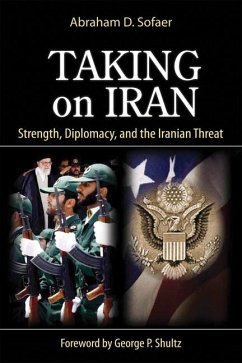Since 1979 the United States has failed to deal effectively with the threat posed to international peace and security by the Islamic Republic of Iran. The range of Iranian misconduct since that time has been broad, resulting in the deaths of some one thousand US nationals. The United States has repeatedly protested these activities and issued numerous threats but has done little or nothing to deter the Iranian Revolutionary Guard Corps (IRGC). Instead of responding in self-defense to IRGC surrogate and direct attacks, the United States has focused almost exclusively on Iran's nuclear program, threatening to prevent Iran from acquiring nuclear weapons, by force if necessary, and imposing economic sanctions that are damaging Iran's economy. But threats of force to prevent Iran from developing nuclear weapons have limited credibility given the long record of US weakness in responding to IRGC aggression, as well as the US failure to follow up on such threats against North Korea. Although using force to destroy or set back Iran's nuclear program has been kept "on the table" by US presidents, the difficulties of justifying and implementing such attacks on Iran's nuclear program are formidable, with possibly serious collateral consequences, widespread criticism, and ultimate failure. Equally troublesome, however, is failing to prevent Iran from acquiring nuclear weapons and attempting instead to contain Iran through the threat of annihilation, missile defense, and economic and political pressure. A nuclear-armed Iran would increase instability in the Middle East, further embolden the IRGC, and lead to nuclear arms proliferation with catastrophic results. Taking on Iran presents an alternative and viable approach by which the United States could deal with Iran's nuclear program without resorting to either preventive attacks or accepting a nuclear-armed Iran. The author urges the United States to exercise its right to defend US forces, nationals, and interests from IRGC aggression--a long overdue, practical, and principled strategic imperative. Military actions against IRGC targets related to its surrogates or terrorist attacks on the United States, he explains, would (unlike preventive attacks on Iran's nuclear program) be legally defensible, legitimate, practical, and likely to succeed. He explains how defending against IRGC aggression could, in addition to deterring illegal conduct, convince Iran to negotiate in earnest. And he describes in detail how, if Iran does respond to US defensive actions by seeking genuine diplomatic engagement, the United States should engage with Iran on the basis of proven practices applied in US/Soviet negotiations. This book clarifies why, as in dealing with other international security challenges, effective diplomacy based on strength is the most likely formula for securing peace without resort to major conflict.
Hinweis: Dieser Artikel kann nur an eine deutsche Lieferadresse ausgeliefert werden.
Hinweis: Dieser Artikel kann nur an eine deutsche Lieferadresse ausgeliefert werden.








